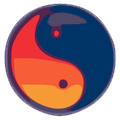"Translated
as "the great ultimate"[1],
Taiji
is
understood to be the ideal of
existence. Taiji
(pronounced
tie-jee) is not perceived as a simple list of all things
and potential things, but rather a complex interconnection
of all things in all possible contexts. It not only
represents what exists, but also that which has existed,
will exist, and could potentially exist.
Before the concept of Taiji,
the world as it was known was unexplainable, but
Taiji
ties all
traditions and practices together; it is understood to be
the highest conceivable principle by which existence
flows[2]."
[3]
Our day to day lives present us with many chores, problems
and responsibilities. Some of us pursue a life very complex
in nature. It is our choice--the path we have chosen. To
effectively maintain what we've achieved, develop further,
and explore new interests, some assistance may be needed.
We will give you that assistance.
[1] Chen ,
Ellen M. (1989). The Tao Te Ching: A New
Translation and Commentary. St. Paul Minnesota: Paragon
House
[2]
Wu, Laurence C.
(1986). "Fundamentals of Chinese Philosophy" University
Press of America. ISBN (perfect): 0-8191-5571-5 ISBN
(cloth): 0-8191-5570-5
[3]
"Taiji," in
Wikipedia: The
Free Encyclopedia; (Wikimedia Foundation Inc.,
updated 29 February 2009, 21:55) [encyclopedia on-line];
available from http://en.wikipedia.org/wiki/Taiji#cite_note-0;
Internet; retrieved 11 March 2009.
